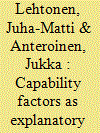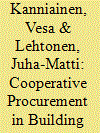| Srl | Item |
| 1 |
ID:
144157


|
|
|
|
|
| Summary/Abstract |
In clarifying the conceptual and terminological issues of the unit cost growth of military equipment, six recent empirical studies on unit cost growth are reviewed and evaluated in this article. Even though the reported unit cost growth rates differ between equipment type and the individual studies, all of the studies find the unit cost growth rates of each military equipment type exceeding inflation. Various explanations proposed by different authors are reviewed. Unit cost growth studies omit corrections for quality changes of equipment, unlike the standard practice in inflation calculation. By bringing the military capability perspective into the discussion of unit cost growth, this article proposes a new approach to equipment unit cost growth, thereby enabling the collective evaluation of quality change with price change. This approach is demonstrated through a case study involving an armoured personnel carrier (APC). Although the price of the APC had increased sixfold with only a minor improvement in transportation capability, the proposed approach shows that the purchasing decisions of its successive generations may have still been cost-effective. The APC case demonstrated that the proposed approach can be successfully applied and yield meaningful results.
|
|
|
|
|
|
|
|
|
|
|
|
|
|
|
|
| 2 |
ID:
171010


|
|
|
|
|
| Summary/Abstract |
The economic benefits of cooperative procurement derive from, at minimum, increased bargaining power relative to contractors and from economies of scale in production. There is, however, a puzzle: why is this kind of procurement so rare? This paper introduces a bargaining model with forward-looking expectations about the scale of procurement. It is shown that the price sensitivity of the scale of acquisition is favourable for the buying partnership, as it tends to push down the bargaining price. We propose several explanations for why it is hard to align buyers’ incentives: First, preferences for the properties of the products are country-specific, with divergent implications for national security. Second, countries that place a low value on the product have more bargaining power than those that value it highly, and may require a side payment in order to enter a partnership, while the partner may not have sufficient incentives to make such a payment. Third, the gains from cooperative procurement for the producer may not be sufficient to compensate for conflicting preferences among contractors. Fourth, while the future unpredictability of technologies or the future risks of deteriorating national security might support longer-term cooperative procurement, short-term opportunism tends to prevent long-term commitments.
|
|
|
|
|
|
|
|
|
|
|
|
|
|
|
|